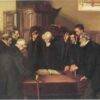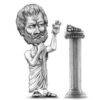Category: Evangelical Calvinist
Writings from the blog: Athanasian Reformed (aka The Evangelical Calvinist). Senior Reformed scholars present a coherent and impassioned articulation of Calvinism for today’s world.
‘The Father’s Theology’: An evangelical theology versus a philosophical theology
I am a proponent of an evangelical theology. ‘Evangelical’ in the sense that the starting point for theology, I contend, ought to be the Evangel or Gospel Hisself. This is contrary to the philosophical, or hard metaphysical theologies that have characterized much of the Western tradition’s theologizing for centuries (i.e., we could think of Thomas Aquinas all the way into Nietzsche et al.) An ‘evangelical theology’ is a kerygmatic theology; particularly when we understand that the kerygma is the pronouncement and announcement that Jesus is Lord. It is a theology of the Father who declares, “this is my dearly beloved…
Introducing the Real classical Calvinism: ‘If you’re going to debate it, at least know what you’re debating about’
As usual, in the right online environs, the Calvinist-Arminian (Provisionist) debate has carried on unabated by not actually engaging with the actual entailments of a real-life Calvinist-Arminian theology. In other words, what the reader will find, are people who are in this interminable joust, oriented by the five points of Calvinism, or not. There is a free-flow exchange between favorite prooftexts, and their ostensible exegesis, and/or an intractable debate about this or that philosophical understanding vis-à-vis God’s sovereignty and human agency in freewill. I am almost positive that everyone reading here is well aware of what I am referring to….
Torrance’s Theological-Exegetical Gloss on Romans 8:31-39: And a Word of Encouragement About God’s Unrelenting Love For Us
As I have been rereading TF Torrance’s The Christian Doctrine of God: One Being Three Persons, I came across a passage that struck me as a sort of theological-exegetical gloss of Romans 8:31-39. Torrance is often accused of not doing any biblical-exegetical work; but I would counter, that in his role as a Christian Dogmatist his work is saturated in the thematics that allow Scripture to say what it does about God and His works. I would contend that, Torrance, as a Christian Dogmatist, par excellence, has Scriptural themes and their reality in Christ, pervading all of his writings. What…
Our ‘Lost Time’ in the ‘New Time’ of the Saga of Jesus Christ: How Saga Functions in Barth’s Usage
Barth is often depicted as a liberal or “neoorthodox” theologian who repudiates the inerrancy of Holy Scripture, which alone anathematizes him for the evangelical. Barth is often presented as an enemy to conservative orthodox Christianity, with his neo-Kantian, reified Hegelianism ripping to shreds any hope of giving the evangelical churches anything wholesome and genuinely biblical to cogitate upon. Barth, in many sectors of the evangelical and Reformed churches, is considered as enemy of the state to the health and well-being of historically orthodox Christianity. Barth is often demonized, caricaturized, and flambéed just at the point that someone moves their lips into…
Christian Theology Done by the Sufferers
Theology done by people in the depths of suffering looks much different than theology done by people who are relatively comfortable. When I say “theology” I mean anything anyone thinks or does towards the magnification of Jesus Christ. And this might not even be a conscious effort, especially for those in the thralls of suffering. Indeed, it is in these seasons, when “we have the sentence of death on us so that we will learn to trust the One who raises the dead,” that we are simply living out of the depths of Christ’s life for us (ecstatic existence);…
The ‘Internal History of Jesus’ and the Gospel According to Wilhelm Herrmann
In the following Bruce McCormack sketches out, what Wilhelm Herrmann believed about the ‘historical Jesus as the ground of faith.’ Herrmann was Barth’s teacher while Barth studied at the University of Marburg. As you read this, from your own perspective as a Christian, do you find anything objectionable about the way Herrmann conceived of Jesus and salvation therefrom? If you know anything about the school that Herrmann represented in his day, then you will understand that there were some attending problems with his theology; as Barth later would come against himself. But as a stand-alone representation of Herrmann’s thought on…
classical Calvinists (and Arminians) Don’t Actually Affirm Total Depravity
I just wrote the following, off the top, as a long Tweet; take it for what it’s worth. It’s ironic when you think about it: classical Calvinists claim to be strident proponents of a doctrine of total depravity. But when you actually look at the historical ideational development there, what you get from them is a Thomist intellectualist anthropology. This entails that the intellect is the defining component of what defines a human being as a human being in a faculty psychology. The classical Calvinist (and Arminian), following Aquinas and Aristotle, requires that at the time of the fall the…
A Screed on the Relationship Between the Biblical Exegete and Theologian
When people say that theology isn’t really biblical studies, they fail to understand what theology is doing. Good theology is engaging with the inner theo-logic of the text of Holy Scripture and its reality in Jesus Christ. It’s engaging with the underlying notions that allow the Scripture writers to write and assert what they do about God. It’s identifying the theological ontological ground that sees Scripture in its taxis or order vis a vis as an instrument of the living and triune God. Good theologians are engaging with the Holy, as such, they unswervingly trust that God is a good…
God Alone is Good
17 And as he was setting out on his way, one individual ran up and knelt down before him and asked him, “Good Teacher, what must I do so that I will inherit eternal life?” 18 So Jesus said to him, “Why do you call me good? No one is good except God alone. 19 You know the commandments: ‘Do not murder, do not commit adultery, do not steal, do not give false testimony, do not defraud, honor your father and mother.’” 20 And he said to him, “Teacher, all these I have observed from my youth.” 21 And Jesus, looking at him, loved him, and said to him, “You lack one thing: Go, sell all that you…
All You Ever Wanted to Know about Barth’s Analogy of Faith
The Deus absconditus (‘hidden God’) is the Deus revelatus (‘revealed God’) in Jesus Christ. But how do we know this? Because Jesus said so; He demonstrated so. A genuine Christian theologian isn’t given to fits of speculation about godness. A genuine Christian theologian is definitionally such simply by the confession that they are Christian. But much of this has gone by the wayside in the development of dogma in the catholic Church. In Latin theology for example, where Thomas Aquinas has been canonized, for both the Catholic and Protestant theologian alike, the method for developing a doctrine of God is…








